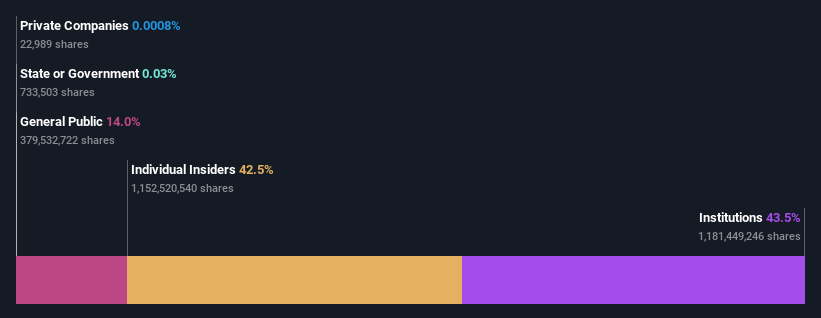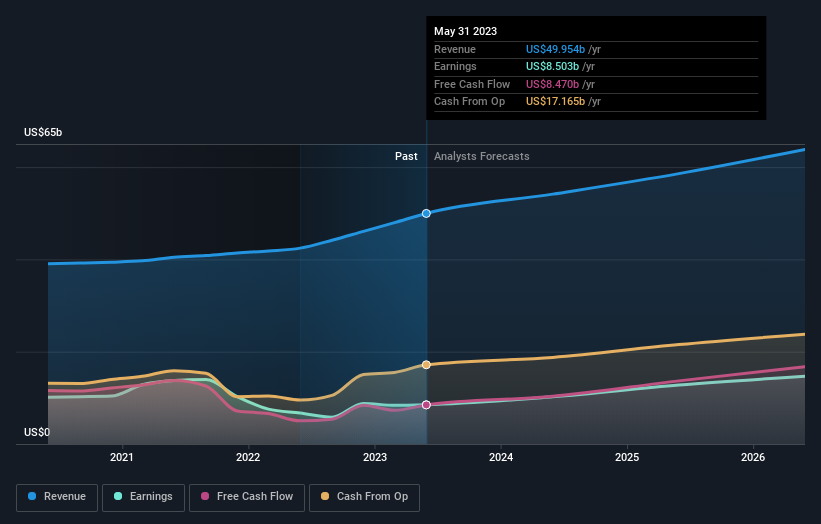Oracle Corporation's (NYSE:ORCL) institutional investors lost 3.8% over the past week but have profited from longer-term gains
Key Insights
Significantly high institutional ownership implies Oracle's stock price is sensitive to their trading actions
A total of 3 investors have a majority stake in the company with 52% ownership
A look at the shareholders of Oracle Corporation (NYSE:ORCL) can tell us which group is most powerful. And the group that holds the biggest piece of the pie are institutions with 44% ownership. That is, the group stands to benefit the most if the stock rises (or lose the most if there is a downturn).
No shareholder likes losing money on their investments, especially institutional investors who saw their holdings drop 3.8% in value last week. Still, the 62% one-year gains may have helped mitigate their overall losses. But they would probably be wary of future losses.
In the chart below, we zoom in on the different ownership groups of Oracle.
See our latest analysis for Oracle
What Does The Institutional Ownership Tell Us About Oracle?
Many institutions measure their performance against an index that approximates the local market. So they usually pay more attention to companies that are included in major indices.
We can see that Oracle does have institutional investors; and they hold a good portion of the company's stock. This implies the analysts working for those institutions have looked at the stock and they like it. But just like anyone else, they could be wrong. It is not uncommon to see a big share price drop if two large institutional investors try to sell out of a stock at the same time. So it is worth checking the past earnings trajectory of Oracle, (below). Of course, keep in mind that there are other factors to consider, too.
Oracle is not owned by hedge funds. Because actions speak louder than words, we consider it a good sign when insiders own a significant stake in a company. In Oracle's case, its Top Key Executive, Lawrence Ellison, is the largest shareholder, holding 42% of shares outstanding. With 5.1% and 4.3% of the shares outstanding respectively, The Vanguard Group, Inc. and BlackRock, Inc. are the second and third largest shareholders.
After doing some more digging, we found that the top 3 shareholders collectively control more than half of the company's shares, implying that they have considerable power to influence the company's decisions.
While it makes sense to study institutional ownership data for a company, it also makes sense to study analyst sentiments to know which way the wind is blowing. There are a reasonable number of analysts covering the stock, so it might be useful to find out their aggregate view on the future.
Insider Ownership Of Oracle
The definition of company insiders can be subjective and does vary between jurisdictions. Our data reflects individual insiders, capturing board members at the very least. The company management answer to the board and the latter should represent the interests of shareholders. Notably, sometimes top-level managers are on the board themselves.
I generally consider insider ownership to be a good thing. However, on some occasions it makes it more difficult for other shareholders to hold the board accountable for decisions.
Our information suggests that insiders maintain a significant holding in Oracle Corporation. Insiders own US$132b worth of shares in the US$311b company. That's quite meaningful. It is good to see this level of investment. You can check here to see if those insiders have been buying recently.
General Public Ownership
The general public, who are usually individual investors, hold a 14% stake in Oracle. While this group can't necessarily call the shots, it can certainly have a real influence on how the company is run.
Next Steps:
It's always worth thinking about the different groups who own shares in a company. But to understand Oracle better, we need to consider many other factors. To that end, you should learn about the 2 warning signs we've spotted with Oracle (including 1 which is a bit concerning) .
But ultimately it is the future, not the past, that will determine how well the owners of this business will do. Therefore we think it advisable to take a look at this free report showing whether analysts are predicting a brighter future.
NB: Figures in this article are calculated using data from the last twelve months, which refer to the 12-month period ending on the last date of the month the financial statement is dated. This may not be consistent with full year annual report figures.
Have feedback on this article? Concerned about the content? Get in touch with us directly. Alternatively, email editorial-team (at) simplywallst.com.
This article by Simply Wall St is general in nature. We provide commentary based on historical data and analyst forecasts only using an unbiased methodology and our articles are not intended to be financial advice. It does not constitute a recommendation to buy or sell any stock, and does not take account of your objectives, or your financial situation. We aim to bring you long-term focused analysis driven by fundamental data. Note that our analysis may not factor in the latest price-sensitive company announcements or qualitative material. Simply Wall St has no position in any stocks mentioned.
Join A Paid User Research Session
You’ll receive a US$30 Amazon Gift card for 1 hour of your time while helping us build better investing tools for the individual investors like yourself. Sign up here

 Yahoo News
Yahoo News 


